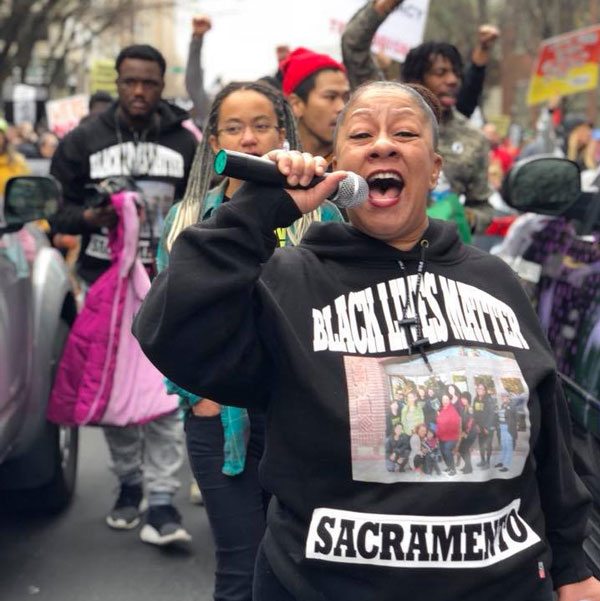
March 31, 2018; Sacramento Bee
It’s been two weeks now since Stephon Clark, age 22, was fatally shot by Sacramento police. Clark “was struck eight times, mostly in his back, according to an independent autopsy released this past Friday,” report Frances Robles and José A. Del Real in the New York Times. The autopsy, which was done at Clark’s family’s request, was conducted by Dr. Bennet Omalu. Omala found that Clark “was shot three times in his lower back, twice near his right shoulder, once in his neck and once under an armpit. He was also shot in the leg. The neck wound was from the side, the doctor found, and he said that while the shot to the leg hit Mr. Clark in the front, it appeared to have been fired after he was already falling.” The shooting took place in Clark’s grandmother’s backyard. The only object Clark had on his body was his cellphone.
As might be expected, Clark’s death has prompted extensive protests. What may be different, though, is, as a Sacramento Bee editorial points out, that residents appear to have been able to push city leaders into a broader discussion.
As the Bee’s editors write:
The questionable shooting of Clark in his grandparents’ backyard two weeks ago has prompted, not just outrage at law enforcement, but also an important discussion about race, poverty and inequity—and the policy choices that have left them to fester in neighborhoods like Meadowview, where many residents believe “disadvantage” has become an excuse for overly aggressive policing.
Hundreds attended a City Council-hosted forum, “most of them angry and from poor black neighborhoods,” notes the Bee. The paper adds that people attending the forum “had a long list of grievances. They complained about the escalating price of housing, stagnant wages and the lack of decent jobs…the paucity of investment in their neighborhoods—the failing schools, the underfunded community centers—while downtown and midtown enjoy spruced-up parks, new grocery stores, hospitals and health clinics, and trendy restaurants and bars.”
Sign up for our free newsletters
Subscribe to NPQ's newsletters to have our top stories delivered directly to your inbox.
By signing up, you agree to our privacy policy and terms of use, and to receive messages from NPQ and our partners.
“This city is killing us,” exclaimed Malaki Seku-Amen, founder of the California Urban Partnership. Tanya Faison of Black Lives Matter Sacramento said, “It feels like genocide.”
City Councilman Jay Schenirer was responsive. “I hear your demands for equitable treatment, processes, resources, and access for all Sacramentans. How do we bring equitable investments and adequate resources to our struggling neighborhoods? How we make sure any investments made in these communities directly benefit those for whom they are intended?”
The previous mayor, Kevin Johnson, who served from 2008 to 2016, was the city’s first Black mayor, but the agenda he pursued favored downtown interests over those of low-income neighborhoods of color. The Bee notes that under “his direction, the city sunk $255 million in subsidies into the sparkling Golden 1 Center to keep the Kings [professional basketball team] from leaving town.” Other city largesse: There is $90 million slated to expand the convention center, $83 million to renovate Community Center Theater, $30 million to open the Powerhouse Science Center, and $48 million for a possible future Major League Soccer stadium.
“The city’s operating budget,” the Bee adds, “is a bastion of inequity…In the current budget, more than $35 million is going to police and fire, and only about $2.6 million to community centers, neighborhood services and programs for teens.”
For their part, consistent with a broader trend in professional sports, the Sacramento Kings have expressed their support for the broader racial equity campaign. While the Kings are hardly the first National Basketball Association team to express solidarity with victims of police shootings, they are the first sports team to enter into a formal public partnership with a Black Lives Matter chapter. Specifically, according to a media release, the Kings have committed to a multi-year partnership with Black Lives Matter Sacramento and the “Build. Black. Coalition to support the education of young people and to provide the workforce preparation and economic development efforts needed to truly #BuildBlackFutures.”
As for the city government, it remains to be seen what policy changes will actually be made. The mayor and “the City Council must do more than listen,” the Bee’s editorial board insists. “They need to come up with a smart plan, and make sure there’s enough staff and money to execute it. The business community must step up, too.”—Steve Dubb













